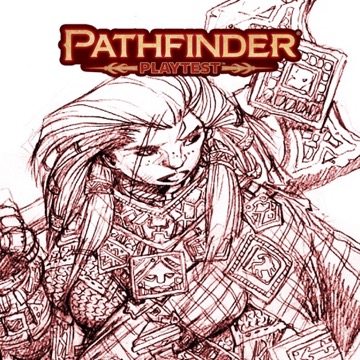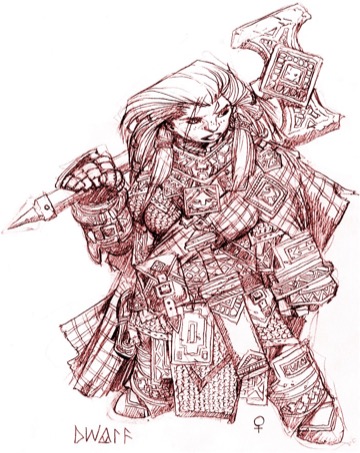The term "proficiency" has been a part of the Pathfinder rules since the very beginning, but in the Pathfinder Playtest Rulebook, we've expanded the concept to cover more than just weapons and armor. In the new proficiency system, your proficiency matters for just about every check you attempt and DC you have. You don't just have proficiency in weapons, which helps when you swing a sword, or proficiency in armor, which protects you when you try to avoid a blow—instead, proficiency covers everything from axes to spells, from Acrobatics to Thievery, and from Perception to Will saves. Your proficiency in Fortitude saves can allow you to shake off virulent poisons in an instant, and your proficiency in Diplomacy might help you stop a fight before it begins. There are five different ranks of proficiency.
Untrained
An untrained character lacks even basic proficiency. He adjusts his checks and DCs by –2 and sometimes flat-out can't attempt certain things. For instance, someone who is untrained in Thievery might be able to try to steal from someone but isn't skilled enough to pick a lock, no matter how high level he is.
Trained
A trained character has put in enough work that she's able to perform effectively. She can even start taking skill feats to achieve new and special effects with her skills. Many skill feats grow more and more powerful as your proficiency rank increases.
Expert
An expert is particularly accomplished in a particular field, adjusting her checks and DCs by +1, and gains access to more powerful features requiring expertise.
Master
A master is extremely skilled in an area, and she can achieve incredible results. In addition to adjusting her checks and DCs by +2, she may unlock powerful perks like master-level skill feats for skills, or the ability to dodge fireballs completely for Reflex saves. Other than a few classes like fighters, with their incredible command of weapons, characters can't become masters until level 7 at the earliest, and sometimes much later.
Legendary
A legendary character is world-class, and in addition to adjusting checks and DCs by +3, can routinely produce results that defy real-world explanation, even if they're not a spellcaster. For instance, a character who is legendary in Survival could learn to survive without food, water, or air in a featureless void, a character legendary in Thievery might be able to steal the armor off a guard, and a character with a legendary Will save might have a mind so strong that no mental intrusion can fully affect him. Most characters can't hope to become legendary until level 15 at the earliest, and even the mightiest fighters reach these heights with their weapons only at level 13. Most characters become legendary in only a few skills and one or two other statistics.
Proficiency Modifier
Your proficiency modifier is based partly on your rank and partly on your level—you add your level to the modifier from your rank to determine your proficiency modifier. For instance, a level 20 rogue who is legendary at Stealth might have a +23 proficiency modifier, while a level 1 paladin who is untrained at Stealth might have a –1 proficiency modifier. But does that mean that your level 20 untrained and magic-hating barbarian knows more about arcane magic than your friend's level 1 bibliophile wizard does? Not really. Your barbarian, with her extensive experience in battle, might be able to identify a dragon's weaknesses much better than the wizard with his ivory-tower book learning, but when it comes to magical theory, identifying the gestures that compose a spell, or other such topics, your barbarian simply doesn't know anything at all.
Gaining Proficiency
For most of your statistics, your starting proficiencies are determined by your class, though for skills, you can assign your ranks as you choose among any of the skills in the game. When it comes to leveling up, all classes gain skill rank increases at every odd-numbered level (or more often for the rogue!). Your other proficiencies increase based on your class and feat choices.
Making the Nonmagical Extraordinary
The best part about proficiencies is the way they push the boundaries for nonmagical characters, particularly those with a legendary rank. If you're legendary in something, you're like a character out of real-world myth and legend, swimming across an entire sea while beating up sea monsters like Beowulf, performing unbelievable tasks like Heracles, or hunting and racing at astounding speeds like Atalanta. While we did perform a bit of research on things like real world Olympic records and average expectations when it came to the lower ranks, masters and especially legends break all those rules. Want your fighter to leap 20 feet straight up and smash a chimera down to the ground? You can do that (eventually)!
And that's the basics of how proficiency works! Thanks for reading, and let us know what you think in the comments.
Mark Seifter
Designer








